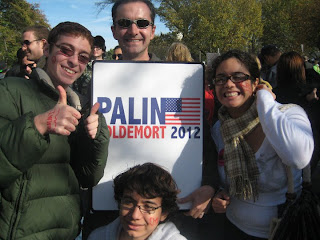As I've already written, this week's case study is about the Israel Palestinian Conflict. Today we met with 2 experts to talk about this issue. We first met with Ghaith al-Omari, a negotiator for Palestine. He has negotiated in the Camp David Accords and has worked for the Palestinian President and Prime Minister. He has been crucial to the Israeli-Palestinian peace process. Although he has some bias, it was extremely hard to tell and he kept the facts straight. You really could not tell what he thought about the issue because he was so even-sided. Right now he's the Advocacy Director of the American Task Force in Palestine (ATFP). Bios of the 2 people are at the bottom
After we met with him, we skyped with a student who was at SEGL last semester. He's from Palestinian descent and now lives in Jordan and goes to the King's Academy in Jordan. Legitimately the King's Academy, like the actual king of Jordan, King Abdullah. He talked about his standpoint. Also, King Abdullah talked to his class yesterday and said some pretty interesting things. The King said that if negotiations between the Palestinians and the Israelis break down now, there will be a huge war this year. The king suggests to support everything that Israeli Prime Minister Benjamin Netenyahu says, so Israeli cannot say that Arab countries don't want peace. They argue that they want peace just as much as anyone else. This student was very calm about this issue and level-headed. From his perspective, he says that the Jews were openly welcomed to Palestine when they first came, and that the Jews massacred many when they got there. I don't necessarily believe all of this, but it's good to hear another perspective.
After that we met with Robert Satloff, the Executive Director of the Washington Institute for Near East Policy. he was so knowledgable and I learned alot from him (and of course Al-Omari too). He went through alot of history with us, and then went into modern day problems. he said the issues started as inter-communal conflict, and then changed to international conflict. He says that resolving issues between states is much easier than resolving issues within the state. Many of the problems between Israel and the other states are alot better now, but the inter-communal issues between the Palestinians and the Israelis is definitely still there, and that is a major issue of course. He answered alot of questions like:
(Roughly)
When did the public start viewing Israel as the perpetrator and the not the victim? ( I asked this)
He said that after the 6 day war in 1967 the Israelis were viewed differently, and viewed themselves differently. They showed unbelievable strength and crushed all the countries that attacked and took land. He argues that after this, Israel became the Goliath, and the Palestinians became David, as opposed to a few years before. Backing up this point, there are less Palestinians in Israel than Jews, so Jews are more prone to become Goliath because they are the majority.
What do we do with Jerusalem?
He says that this is the hardest part. Most attempts at negotiations postpone dealing with Jerusalem until the rest is figured out so negotiations don't break down early. They haven't got that far yet, but in theory this is what would work. ]
Sidenote: Negotiations have been going on for 17 years, Now is the 9th or 10th attempt. Dr. Satloff and Mr. al-Omari have been involved in the negotiations for the entire 17 years.
What do both sides have to give up for peace?
The obvious is land. But what they have to give up is more psychological. They will have to give up part of their Nation's story, and will in part have to recognize the validity in the other side's story.
Will the moratorium end on settlements affect the negotiations?
Both him and al-Omari say it will not affect the negotiations. The Palestinians won't walk away from the table now because there is so much at stake and everyone knows it. If they walk away, settlements continue, there's more conflict, and they don't gain anything. "The Palestinians will get over it."
What do other countries want?
There is a big debate about the importance of the conflict between nations. Many argue it's so relevant because of the worlds' massive muslim population. Maintaining the conflict was/is good for many countries, like Syria, that use the conflict as a distraction from what's going on in their own countries. Syria is not democratic, and often changes the subject to Israel to avoid talk an bad publicity about not being a democracy.
Are their big human rights issues in Gaza and the West Bank? If Palestine becomes a state, will it be just another state with human rights abuses that the US has to deal with? If Hamas comes to power is there a concern that Palestine could become like Saudi Arabia? (My Question)
Gaza has no political life, and there are very strict rules limiting women's rights. Because Hamas (which is in control of Gaza now) wants to rule by Sharia law, it's a concern that if they got power the country could become like Saudi Arabia and have horrible human rights issues.
Those are just a few of many questions asked throughout the day.
I have alot of opinions on the issue. I'm Jewish, and a Zionist, and I think I believe in a 2 State Solution. It's also kind of upsetting to me though that after all the Jews have suffered, we can't even get a land as small as Rhode Island. I understand why though, but it is still kind of upsetting. After all that the Jews have endured, I think Israel as a Jewish state is justified, which many do not think.
Before I came here to SEGL, I had never met anyone who was anti-Israel. In the first week, a girl here asked me, "Are you a Zionist?" I was like "What? Of course I am." To me, all around where I've been raised being Jewish pretty much implies that you are a Zionist, so I've never really classified myself as a Zionist before, just a Jew. When she told me that she was anti-Israel, I was shocked. I soon found out she wan't the only one, which was weird to me because pretty much everyone around me supports Israel. In the first few weeks, there was heated talks about Israel, Palestinian Protests next to the school, and the peace talks were happening (we were at the State Dept. the day they were happening here) so we were kind of thrown into the subject right off the bat.
I will always support Israel, though I don't always support everything that they do. But, I understand why they do it in alot of cases. The first day Israel was recognized as a state, it was attacked by 6 different countries! That really tells Israel that they can't be a fully "friendly" state, but a cautious and overly-defensive one. Israel has been known to preemptively strike, but situations like this explain why. They have a reason too after what they've faced.
Today I found myself wondering, "Why weren't people ever the least bit concerned with the Jewish refugees who were kicked out of all their homes everywhere? And now everyone is so concerned with the Palestinian refugees?" This was kind of a selfish, biased, opinion, because my family has historically been subject to anti-semitism. My name is "Star"because my family had to cut it down because people wouldn't hire Jews. I feel like of course we should be concerned with the refugees. It's not a good situation for them, but it wasn't a good situation for the Jews for thousands of years but did anyone care then? It kind of frustrates me. People were saying how it's unfair that Palestinian refugees can never go back to their homes but they want to. Don't you think the Jews would have liked to go back to their homes? Of course, but they couldn't. Jews had no home but Israel because they were mistreated everywhere, and I feel that should be taken into consideration without dwelling too much on the past. Since when did other countries get scorned for displacing refugees? They didn't. But now Israel is? This frustrates me. This however, isn't an excuse to not care about the refugees, it's just kind of frustrating.
I have alot of opinions, many conflicting on this issue. I think there's alot of propaganda, some of which I've fallen for, I have to admit. I really just don't know. I support Israel, but I don't support everything they do, I guess I kind of have to leave it at that for now.
Things I've learned and/or facts of the day:
- 700,000 people fled when Israel was created
- You can't negotiate history despite attempts from Israel and Palestine
- Negotiations broke down in 2000 followed by massive violence
- Major mindset of both sides, "The other side is out to get me"
- Most people on both side want 2 state solution, but an equal amount don't think the other side wants it
- Right now in Negotiations, we know where we want to go, but not how to get there
- Anti-Americans in the Middle East pull the Palestinian card to get people mad
- On this issue, Washington is more progressive than the rest of the country which is unusual
- Negotiations will probably continue despite the end of the moratorium, and they don't think there would be a war if they failed as King Abdullah says
- Camp David went for all or nothing, so they got nothing
- Peace deal is like a divorce
- If you can't get all you want, look at the minimum of what you need
- Don't integrate Hamas into the process unless they change their views. The US did this with the PLO, didn't involve the PLO in negotiations until they changed their views
- To have constructive negotiations, public messaging that comes from both sides needs to be positive; Code of Conduct
- Palestine will not have an army. This is good because the Government can't waste money on unnecessary military spending.
- Have Americans at border of the 2 states because neither side will want to anger the US
- Embargo on Gaza hurts the people not the leaders
- PLO and Hamas fight over who defines palestinian policy
- Positive changes since 1999: 1) Today we know what the goal is 2)we know the outlines of the deed (1967 lines) 3) there's a palestinian realization that it's not only an issue of diplomacy
- Dr. Robert Satloff is the only non-Arab to host an Arabic show
- Conflict started out as inter-communal conflict and turned into international conflict quickly.
- There's about 14 million Jews in the World, 6 million live in Israel
- 1/3 of the Palestinians in the world live in Israel (West Bank and Gaze specifically)
- 1967: 3rd ward, 6 day war, Israel defeated all the countries.
- Henry Kissinger (Nixon's Sec. of State) made idea of making the US indispensable to both states
- "Good fences make good neighbors."
- Iran used to have good relations with Israel until the Iranian revolution
- Because of personal experience, both sides are pessimistic about 2 state solution even though the majority support it.
- International Peacekeepers flee if there's no peace
Ghaith al-Omari: http://www.americantaskforce.org/staff/ghaith_alomari
Robert Satloff: http://www.washingtoninstitute.org/templateC10.php?CID=11
PHEW!!! THAT WAS A LONG POST!















